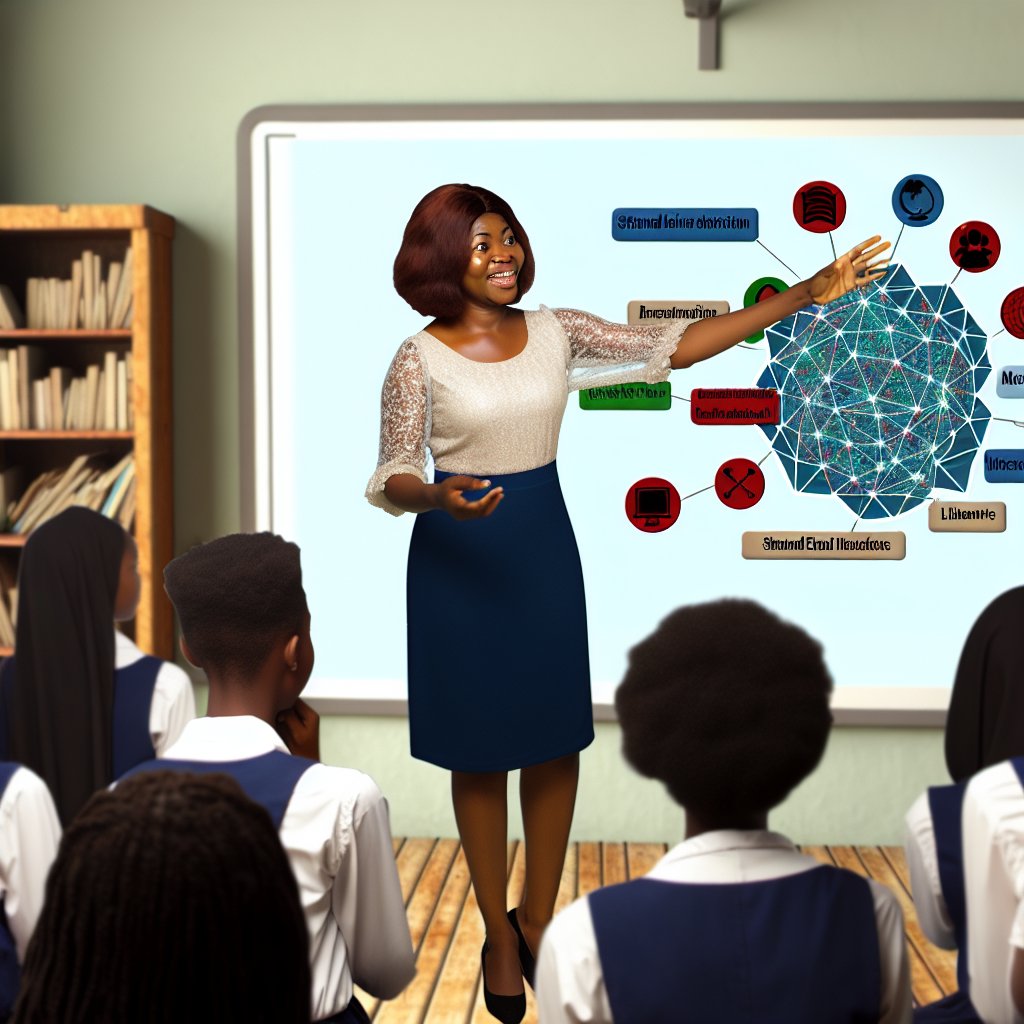Introduction
Nigeria’s education system faces significant challenges today.
High dropout rates and inadequate infrastructure affect learning outcomes.
Many schools lack essential resources, hindering students’ potential.
Traditional teaching methods remain prevalent, but they often fail to engage learners.
Education disciplines in Nigeria traditionally focus on rote memorization.
This approach limits critical thinking and creativity among students.
Subjects often emphasize theoretical knowledge over practical application.
This gap leads to a workforce ill-equipped for modern demands.
Redefining education disciplines can help bridge this gap.
Incorporating innovative teaching methods fosters student engagement.
For instance, project-based learning encourages collaboration and problem-solving skills.
By prioritizing skills over memorization, we can empower students to thrive.
Moreover, integrating technology into education is crucial.
Digital tools enhance interactive learning experiences.
Access to online resources broadens horizons, allowing students to explore various disciplines.
Additionally, blended learning models offer flexibility, catering to diverse learning styles.
Focusing on interdisciplinary studies promotes a holistic understanding.
Subjects like science, technology, engineering, arts, and mathematics (STEAM) encourage creativity and critical thinking.
This integration prepares students for complex, interconnected global issues.
Students develop adaptable skills essential for future careers.
Collaboration between educators, policymakers, and industry leaders is vital.
Developing a curriculum that reflects current societal needs will enhance educational relevance.
Engaging stakeholders ensures that education remains responsive to economic and social changes.
Finally, teacher training must evolve alongside these changes.
Educators need support in adopting new methodologies and technologies.
Continuous professional development programs will equip teachers with necessary skills.
With the right training, teachers can inspire and shape future generations.
Redefining education disciplines in Nigeria is crucial for future learning.
Emphasizing practical skills, technology integration, and interdisciplinary approaches fosters a more relevant education system.
This transformation will enable students to meet the demands of a rapidly changing world.
Current Challenges in Education Disciplines
Nigeria’s education system faces numerous challenges.
These challenges hinder the development of a dynamic and responsive learning environment.
To create an effective educational experience, stakeholders must address these issues.
Overview of the Rigidity in Traditional Curriculum Structures
One significant challenge in Nigerian education is the rigidity of traditional curriculum structures.
Educational institutions often prioritize memorization over critical thinking.
This approach limits students’ ability to engage deeply with content.
Many curriculums follow a one-size-fits-all model.
This model fails to account for students’ diverse learning needs and styles.
Consequently, students often lose interest and motivation to learn.
The following issues exemplify the rigidity of traditional curriculums:
Transform Your Career with Expert Guidance
Get personalized mentorship consulting that’s tailored to your unique path. Our expert advice is actionable and exclusive.
Get Started- Static content that does not evolve with societal needs.
- Strict adherence to outdated methodologies.
- Lack of practical applications and real-world contexts.
- Minimal emphasis on critical thinking and creativity.
Moreover, the focus on standardized testing exacerbates the situation.
Students feel immense pressure to perform well, leading to undue stress and anxiety.
This environment discourages curiosity and exploration, which are crucial for fostering innovation.
Discussion on the Lack of Interdisciplinary Approaches
Another major challenge is the lack of interdisciplinary approaches in education.
Subjects often remain siloed, preventing students from understanding the connections between them.
Students might excel in one subject but struggle to apply that knowledge in another context.
Interdisciplinary learning promotes critical thinking and problem-solving.
However, educational institutions tend to enforce rigid boundaries between subjects.
This separation hampers students’ ability to develop a holistic view of the world.
Key factors contributing to the lack of interdisciplinary learning include:
- Lack of teacher training in integrating disciplines.
- Inadequate resources to support interdisciplinary programs.
- Resistance from educational policymakers to change traditional models.
- Absence of curricula that encourage collaboration across subjects.
Furthermore, interdisciplinary approaches can enhance student engagement.
By connecting concepts from various subjects, educators can create more meaningful learning experiences.
Students can grasp how topics interrelate and how they apply to real-world situations.
Examination of Socioeconomic Factors Affecting Education Delivery
Socioeconomic factors significantly impact the delivery of education in Nigeria.
Poverty, inadequate infrastructure, and limited resources often plague many schools.
These challenges create barriers to effective teaching and learning.
Students from low-income families face unique obstacles.
They lack access to essential educational resources, including books and technology.
Consequently, they fall behind their more affluent peers.
Several socioeconomic issues contribute to this challenge:
- Inconsistent funding for public schools.
- Lack of trained teachers in rural areas.
- Inadequate facilities and classroom space.
- Overcrowded classrooms that hinder personalized attention.
Additionally, socioeconomic disparities lead to differences in educational quality.
Schools in urban areas often receive more funding and resources than those in rural settings.
This discrepancy results in unequal opportunities for students across the country.
The outcomes of these challenges are severe.
Students may drop out due to financial difficulties or lack of interest.
Those who remain often graduate without essential skills required for today’s job market.
To overcome these challenges, Nigeria must invest in educational reform.
Policymakers should prioritize flexible curriculums that emphasize skill development.
Moreover, they must promote interdisciplinary learning that reflects the interconnected nature of modern challenges.
Addressing socioeconomic disparities is equally crucial.
Funding must be allocated more equitably across all schools.
By supporting underfunded institutions, Nigeria can enhance educational access and quality for all students.
Additionally, investing in teacher training and development is essential.
Educators should receive the support and resources necessary to adapt their teaching methods.
This preparation allows them to incorporate innovative strategies into their classrooms.
The future of learning in Nigeria depends on addressing these fundamental challenges.
By embracing a more flexible, interdisciplinary approach to education, stakeholders can create a system that prepares students for the complexities of the modern world.
The ultimate goal should be to empower students with the skills necessary for lifelong learning and success in an ever-changing landscape.
Interdisciplinary Learning in Nigeria
Interdisciplinary learning blends ideas and methods from various academic disciplines.
This educational philosophy promotes collaboration and integration.
It allows students to engage with diverse perspectives.
As education evolves in Nigeria, interdisciplinary approaches become crucial for preparing students for a dynamic world.
Definition and Benefits of Interdisciplinary Education
Interdisciplinary education breaks down traditional subject barriers.
It brings together different fields to solve complex problems.
With this approach, students develop a more holistic understanding of topics.
- Improved Problem-Solving Skills: Students learn to approach challenges creatively.
- Enhanced Engagement: Interdisciplinary programs often involve hands-on projects.
- Collaboration: Students work together with peers from diverse backgrounds.
- Real-World Relevance: Interdisciplinary learning reflects real-world challenges.
- Cognitive Flexibility: Engaging with multiple disciplines develops cognitive flexibility.
Case Studies Showcasing Successful Interdisciplinary Programs in Nigeria
Nigeria has seen several successful interdisciplinary programs in recent years.
These initiatives showcase the benefits of merging various fields of study.
The International School University of Lagos implemented a project-based learning approach.
In this program, students tackle real-world problems through collaboration.
They incorporate insights from science, art, and technology.
The results consistently highlight improved student performance and critical thinking abilities.
Another notable program is the University of Ibadan’s interdisciplinary health program.
This initiative connects medical students with those studying social sciences, economics, and environmental studies.
Together, they explore health issues within broader societal contexts.
This collaboration produces graduates who understand health from multiple perspectives.
The Nigerian Art and Science Collaborative combines creativity and analytical skills.
In this initiative, students from art and science backgrounds work on joint projects.
They learn to appreciate different viewpoints, enhancing their overall educational experience.
How Interdisciplinary Approaches Can Enhance Critical Thinking and Creativity Among Students
Interdisciplinary approaches empower students to think critically.
They encourage questioning, analysis, and the synthesis of information from different sources.
- Encouraging Inquiry: Interdisciplinary programs provoke curiosity.
- Fostering Innovative Solutions: When faced with complex problems, students must think creatively.
- Developing Synthesizing Skills: Students learn to synthesize information from various sources.
- Promoting Open-Mindedness: Exposure to diverse perspectives cultivates open-mindedness.
- Building Research Skills: Interdisciplinary education often requires extensive research.
As Nigerian education systems embrace interdisciplinary learning, they create more well-rounded graduates.
These graduates possess the skills necessary for the 21st-century job market.
Educators play a pivotal role in effectively implementing interdisciplinary approaches.
They must develop curricula that encourage collaboration among students.
Furthermore, fostering partnerships with local businesses and community organizations enhances students’ real-world experiences.
Such partnerships allow students to apply their interdisciplinary knowledge in meaningful ways.
Curriculum development must adapt to meet current employment trends.
This adaptation involves integrating fields such as technology, agriculture, and business into traditional subjects.
By doing so, the education system can align with national development goals and drive economic growth.
Challenges remain in promoting interdisciplinary education across Nigeria.
Resistance to change within traditional educational systems can impede progress.
Educators and policymakers must advocate for the importance of interdisciplinary learning.
Increased awareness can lead to broader acceptance and implementation of these approaches.
Interdisciplinary learning holds immense potential for transforming education in Nigeria.
By breaking down traditional subject silos, students can develop critical skills for the future.
The benefits of improved problem-solving abilities, enhanced engagement, and real-world relevance make a compelling case for interdisciplinary education.
Successful programs across the nation demonstrate its effectiveness.
As the educational landscape continues to evolve, embracing interdisciplinary approaches will be essential for unlocking student potential.
You Might Also Like: Nigeria’s Education Disciplines on the Rise: What to Study in 2024 & 2025
The Landscape of Education in Nigeria
The landscape of education in Nigeria undergoes a profound transformation due to technological advancements.
The integration of technology into the educational system holds the potential to redefine how knowledge is imparted and absorbed.
Current technological tools provide both educators and learners with innovative avenues for teaching and learning.
Current Technological Tools and Platforms Being Used in Nigerian Education
Nigerian education institutions increasingly adopt various technological tools to enhance learning outcomes.
These tools not only facilitate knowledge dissemination but also create engaging learning environments.
- Learning Management Systems (LMS): Platforms like Moodle and Google Classroom empower teachers to share resources, assignments, and feedback efficiently.
- Video Conferencing Tools: Applications such as Zoom and Microsoft Teams enable real-time interaction between educators and learners, breaking geographical barriers.
- Mobile Learning Apps: Solutions like Quizlet and Duolingo provide students access to study resources anywhere, anytime, promoting self-directed learning.
- Simulation and Virtual Labs: Tools like Labster allow science students to conduct experiments in virtual settings, enhancing practical understanding.
- e-Books and Online Libraries: Resources like Google Books and Project Gutenberg offer students extensive reading materials without the burden of physical books.
These tools enable Nigerian educators to craft diverse teaching methodologies that cater to students’ varied learning styles.
They foster an interactive learning atmosphere, engaging students actively rather than passively absorbing information.
The Role of E-Learning and Online Resources in Redefining Learning Disciplines
E-learning has emerged as a game-changer in Nigeria’s educational landscape.
It offers flexibility and accessibility that traditional teaching methods often lack.
- Accessibility: Students in remote areas can now access quality education through online courses, webinars, and recorded lectures.
- Cost-Effectiveness: E-learning reduces the financial burden of commuting and physical study materials, making education more affordable.
- Diverse Learning Options: Online platforms provide various courses, allowing students to explore subjects beyond their formal curriculum.
- Self-Paced Learning: Students can learn at their own pace, revisiting challenging content as needed without pressure.
- Collaborative Learning: Online discussion forums and group projects promote collaboration among students from different backgrounds.
These factors combine to create a dynamic educational experience.
E-learning not only broadens access but also fosters a culture of continuous learning and improvement among Nigerian students.
Future Potential of Technology to Create Personalized Learning Experiences
The future of technology in education is promising.
Innovations will likely enable even more personalized learning experiences tailored to individual student needs.
- Artificial Intelligence: AI can assess students’ learning patterns and recommend personalized study plans and resources.
- Adaptive Learning Systems: Platforms can adjust content delivery based on real-time performance data, ensuring that students receive appropriate challenges.
- Gamification: Integrating game elements into learning can motivate and engage students, making education enjoyable and interactive.
- Data Analytics: Institutions can analyze performance and engagement data to identify areas needing improvement, enhancing educational strategies.
- Virtual and Augmented Reality: These technologies can create immersive learning environments, allowing students to explore complex concepts interactively.
As these technologies continue to evolve, educators in Nigeria can develop more effective instructional approaches.
Personalized learning will become a reality, addressing the unique needs of each student.
Nigeria stands at the cusp of an educational revolution.
Embracing technology will redefine disciplines and enhance the learning experience for all students.
This shift will equip them with the skills necessary to thrive in a rapidly changing world.
The integration of technology in Nigerian education will pave the way for a more inclusive and effective learning environment.
Current tools support this transition, while e-learning expands access to quality education.
The future holds immense promise, with potential technological innovations creating personalized, engaging, and effective learning experiences for all students.
Nigeria’s educators and institutions must continue to embrace these changes.
By doing so, they will ensure that students are well-prepared for the challenges and opportunities that lie ahead.
Uncover the Details: How Digital Learning Can Change the Landscape of Nigeria’s Education System
Cultural Relevance in Education Disciplines
Cultural relevance plays a critical role in shaping educational content in Nigeria.
By incorporating local culture and history, education becomes more relatable and engaging for students.
Integrating cultural elements into the curriculum nurtures a sense of identity among learners.
This sense of belonging can eventually lead to improved academic outcomes.
Importance of Incorporating Local Culture and History
Integrating local culture and history into educational content yields manifold benefits:
- Students develop a strong connection to their heritage.
- Learning materials reflect the realities of students’ lives.
- Cultural context enriches the learning experience.
- Students gain a deeper understanding of societal norms and values.
- A culturally relevant curriculum can bridge gaps between theory and practice.
For instance, using examples from local history in classrooms can ignite students’ curiosity.
When learners see their culture presented positively, they become more motivated to engage.
Additionally, this relevance can combat stereotypes, offering positive representations of Nigerian identity.
How Cultural Relevance Improves Student Engagement and Retention
Implementing culturally relevant education leads to higher levels of student engagement.
Here are ways that cultural relevance influences engagement and retention:
- Enhanced participation in class discussions.
- Increased motivation to complete assignments.
- Stronger collaborative skills in group projects.
- Improved attendance rates.
- Greater emotional investment in learning.
Students who engage with familiar cultural contexts feel compelled to participate.
They are more likely to relate personally to topics discussed in class.
As a result, their academic performance improves significantly.
Culturally relevant materials promote critical thinking and foster discussion.
When students connect with their heritage, they also develop a sense of pride.
This pride can encourage them to explore their culture further.
Examples of Educational Initiatives Celebrating Nigerian Heritage
Several educational initiatives celebrate Nigerian heritage and promote cultural relevance.
These programs serve as exemplary models for integrating culture into academia:
- National History Curriculum: A revised curriculum emphasizes Nigerian history and key historical figures.
- Storytelling Festivals: Events that celebrate indigenous storytelling encourage participation from students.
- Cultural Exchange Programs: Schools connect with local communities to learn indigenous languages and traditions.
- Art and Craft Workshops: Students create artworks inspired by their cultural backgrounds.
- Local Literature Projects: Schools incorporate works from Nigerian authors into reading lists.
These initiatives highlight the diversity and richness of Nigerian heritage.
By actively participating in these activities, students develop a love for their culture.
Additionally, they learn the importance of preserving this culture for future generations.
Encouraging students to bring their cultural experiences into the classroom fosters inclusivity.
Teachers can create an environment where all students feel valued and heard.
This inclusivity promotes a positive classroom atmosphere, enhancing overall learning outcomes.
Cultural relevance thus becomes not just another educational tool but the foundation for enriched learning.
Implications for the Future of Nigerian Education
Incorporating cultural relevance into educational disciplines holds immense potential for Nigerian schools.
It engages students, nurtures identity, and fosters community.
As Nigeria continues to redefine education, embracing cultural relevance is crucial.
Schools must emphasize local contexts and histories to make learning meaningful and impactful.
The future of learning in Nigeria lies in embracing its rich heritage, reflecting the true essence of the nation.
Ultimately, this shift toward cultural integration can redefine educational landscapes across Nigeria.
Educators, policymakers, and communities must collaborate to ensure that curricula emphasize local culture.
As we move forward, let us commit to creating learning experiences that deeply resonate with every student.
Uncover the Details: High-Demand Educational Disciplines Shaping Nigeria’s Future
Collaborative Learning Environments
The modern educational landscape in Nigeria is evolving.
Collaborative learning environments play a critical role in this transformation.
Students benefit tremendously from teamwork and collaboration.
Research indicates that these methods enhance student learning outcomes significantly.
The Impact of Teamwork and Collaboration
Teamwork fosters a culture of cooperation.
This environment encourages students to share diverse perspectives.
Consequently, learners develop critical thinking and problem-solving skills.
Collaboration improves communication skills as well.
Students engage in discussions, debates, and group projects regularly.
These activities refine their abilities to articulate ideas clearly.
Moreover, teamwork builds social skills.
Students learn to respect different viewpoints.
This respect fosters empathy and inclusivity within the classroom.
Studies show that collaborative learning increases retention rates.
Students who work together often remember information better than those who study alone.
This retention translates to higher academic achievement and greater enthusiasm for learning.
Strategies for Fostering Collaboration
Implementing effective strategies encourages collaboration among students and educators.
Schools can explore various methods to integrate teamwork into the curriculum.
- Project-Based Learning: Engaging students in real-world projects promotes teamwork. It allows them to apply their knowledge collectively.
- Peer Teaching: Encouraging students to teach concepts to one another reinforces understanding. This method also fosters accountability among peers.
- Group Assessments: Collaborative assessments reflect real-world tasks. These evaluations can highlight the importance of teamwork in achieving outcomes.
- Facilitated Discussions: Teachers can organize regular discussions on various subjects. These discussions encourage students to share ideas and challenge each other constructively.
- Technology Integration: Utilizing digital tools can enhance collaboration. Platforms like Google Classroom facilitate group projects and communications.
It is vital for educators to create a positive atmosphere.
When students feel safe and supported, collaboration thrives.
Educators should model respectful communication and active listening.
The Importance of Partnerships
Building partnerships with local communities and industries is essential.
These connections provide practical resources and experiences for students.
Collaborations can enhance the relevance of education.
Local businesses offer apprenticeships and internships.
Such opportunities allow students to network and gain invaluable hands-on experience.
Real-world applications of skills learned in the classroom solidify their understanding.
Moreover, communities can contribute to curricula.
They can share insight into the skills needed in today’s job market.
This collaboration ensures that educational programs remain aligned with industry demands.
Engaging parents in the process also strengthens community ties.
Involving families in school activities promotes a sense of shared responsibility.
This approach encourages parents to support their children’s education actively.
Furthermore, partnerships with non-profit organizations can provide resources.
These organizations often have experience with educational initiatives.
Leveraging their expertise can enhance collaboration within schools.
Collaborative Learning as a Transformational Element
In summary, collaborative learning environments revolutionize education in Nigeria.
The power of teamwork significantly improves student learning outcomes.
By implementing effective strategies, educators can maximize collaboration.
Partnerships with local communities and industries further enhance the learning experience.
Together, these elements can create a robust educational framework.
This framework prepares students for future challenges and opportunities.
As Nigeria moves forward, embracing collaboration will remain crucial.
It can shape the future of learning, fostering a generation of innovative thinkers and dynamic leaders.
Learn More: How to Choose the Right Technical School in Nigeria

The rapidly changing landscape of the global economy demands a reevaluation of educational strategies in Nigeria.
Traditional education is no longer sufficient.
Students need to acquire future skills to thrive in the modern workforce.
To prepare them, educational disciplines must align closely with industry needs.
This section discusses essential skills, the need for alignment, and initiatives for skill development.
Essential Skills for the Future Job Market
Identifying essential skills is crucial for equipping students.
Here are the key skills that educators must prioritize:
- Digital Literacy: In an increasingly digital world, students must be proficient with technology. This includes using various software, understanding data analysis, and engaging with digital communications.
- Critical Thinking: Students need to analyze information critically. They must evaluate arguments, identify biases, and solve complex problems creatively.
- Collaboration: The ability to work effectively in teams is vital. Students should learn to communicate, share ideas, and work toward common goals.
- Adaptability: The future job market will require workers to adapt quickly. Students must learn to embrace change and approach new challenges with resilience.
- Emotional Intelligence: Understanding and managing emotions helps students navigate workplace dynamics. Developing empathy can enhance interpersonal skills.
- Innovative Thinking: Encouraging creativity fosters problem-solving capabilities. Students should learn to think outside the box and generate new ideas.
Importance of Aligning Education Disciplines with Industry Needs
Aligning educational disciplines with the needs of various industries is essential.
The job market is rapidly evolving, and so are the skills required by employers.
The following points highlight the importance of this alignment:
- Job Readiness: Students who possess skills aligned with industry needs are more employable. This reduces the skill gap between graduates and job requirements.
- Industry Partnerships: Collaborating with industry leaders can enhance curriculum design. Partnerships between schools and businesses can lead to relevant training programs.
- Curriculum Development: Educational institutions must incorporate feedback from employers. This ensures that graduates are equipped with necessary competencies.
- Internships and Work Experience: Practical experiences are crucial for learning. Students should engage in internships to gain hands-on knowledge in real-world settings.
- Continuous Learning: Industries evolve, and so should educational programs. Providing continuous education helps individuals keep pace with changes in their fields.
Initiatives for Skill Development and Vocational Training in Nigeria
Nigeria has made strides in addressing skill development.
Various initiatives aim to prepare students adequately for the workforce.
Here are some notable efforts:
- National Youth Service Corps (NYSC) Skills Acquisition Program: This program equips graduates with vocational skills. It targets youth unemployment by providing training in various fields.
- Technical and Vocational Education and Training (TVET): TVET offers hands-on training. It prepares students for specific trades, increasing their employability.
- Partnerships with Global Organizations: Collaborations with organizations like UNDP and UNESCO create opportunities for skill development. These partnerships help in designing curriculum relevant to industry demands.
- Entrepreneurship Programs: Encouraging entrepreneurship helps foster innovation. Schools and universities provide training that empowers students to start their own businesses.
- Online Learning Platforms: Digital platforms offer a wide range of courses. These platforms allow students to learn essential skills flexibly and conveniently.
- Government Grants and Funding: Various government initiatives provide funding for skill development projects. Scholarships and grants support organizations that focus on vocational training.
Transforming Nigeria’s Education System for the Future
To prepare Nigerian students for the future workforce, educational disciplines must be redefined.
Identifying essential skills helps align curriculum design with industry needs.
Emphasizing digital literacy, critical thinking, and adaptability prepares students for any challenge.
Initiatives like TVET and entrepreneurship training are vital in equipping the youth.
By fostering partnerships with industries and encouraging continuous learning, Nigeria can enhance its education system.
The future of learning hinges on such transformations.
Ultimately, aligning education with the evolving job market will empower students to succeed in their careers.
Policy Recommendations for Restructuring Education Disciplines
Nigeria’s education system faces numerous challenges.
To address these, we need a comprehensive policy framework.
Our reforms should aim at fostering innovation and inclusivity.
Here are recommended reforms to enrich the national education policy and support innovative practices.
Suggested Reforms to the National Education Policy
- Integrate Technology in the Curriculum: Schools should ensure that students learn to navigate modern tools securely.
- Curriculum Review: Policies should promote collaboration with industry stakeholders for relevant content.
- Focus on Skill Development: Schools must provide vocational training resources.
- Encourage Interdisciplinary Learning: Policies should reward programs that integrate subjects like science and mathematics.
- Support for Teacher Training Programs: Policies should enable teachers to attend workshops on innovative teaching methods.
Encouragement for Government and Stakeholders to Invest in Education Infrastructure
Investment in education infrastructure is crucial for any sustainable reform.
The government and relevant stakeholders must prioritize financial allocations.
Here are investment areas to focus on:
- Modernizing School Facilities: Investments should ensure that classrooms are conducive to learning.
- Building Digital Infrastructure: The government must prioritize projects that enhance digital access in rural areas.
- Equipping Classrooms with Technology: Investments in educational technology can aid diverse learning experiences.
- Creating Safe Learning Environments: Investments should aim to provide adequate security measures and facilities.
- Funding Extracurricular Activities: Stakeholders should fund sports, debates, and arts programs.
The Role of Educators in Advocating for Change
Educators play a crucial role in transforming the education landscape.
They act as advocates for necessary reforms and promote best practices.
Here’s how educators can contribute:
- Leading By Example: Teachers who adopt innovative practices inspire students and colleagues alike.
- Engaging with Policymakers: Educators should participate in policy discussions to provide valuable feedback.
- Promoting Research and Development: Educators can drive research initiatives to assess teaching effectiveness.
- Creating Learning Communities: Teachers should establish professional learning communities.
- Mentoring Future Educators: Experienced educators can mentor novice teachers to enhance teaching quality.
Restructuring education disciplines in Nigeria requires multifaceted policy recommendations.
Integrating technology, conducting regular curriculum reviews, and emphasizing skill development are vital.
Government investment in infrastructure is essential for supportive educational environments.
Educators’ advocacy and professional engagement can drive these changes.
Together, these efforts pave the way for a brighter future in education.
Transforming Education in Nigeria
In this blog, we explored the urgent need to redefine education disciplines in Nigeria.
We discussed the current challenges facing the education system.
These challenges include outdated curricula, insufficient resources, and a lack of relevance to contemporary society.
We highlighted how a transformative approach can enhance learning outcomes for students.
Focusing on interdisciplinary studies encourages creativity and critical thinking.
Moreover, integrating technology into education can make learning more engaging and accessible.
Collaboration among educators, policymakers, and communities is crucial for this transformation.
Such cooperation will create a more holistic educational environment.
It will also ensure the relevance of education to the socio-economic realities of Nigeria.
Redefining education disciplines is essential for the future of learning in Nigeria.
It allows students to develop essential skills that meet job market demands.
Furthermore, it fosters a culture of lifelong learning and adaptability.
As we move forward, we call on all stakeholders to take action.
Educators should embrace innovative teaching methods and curricula.
Policymakers must prioritize education reforms and resource allocation.
Communities should also support educational initiatives that focus on practical skills.
Together, we can build a resilient education system that prepares Nigeria’s youth for the future.
By working collaboratively, we can ensure that Nigerian education evolves into a dynamic and inclusive framework.
This transformation is not a challenge but an opportunity for growth and development.
Additional Resources
21st Century Learning Technologies Use In Nigerian Classrooms …
The Impact of Artificial Intelligence on Learning, Teaching, and …




